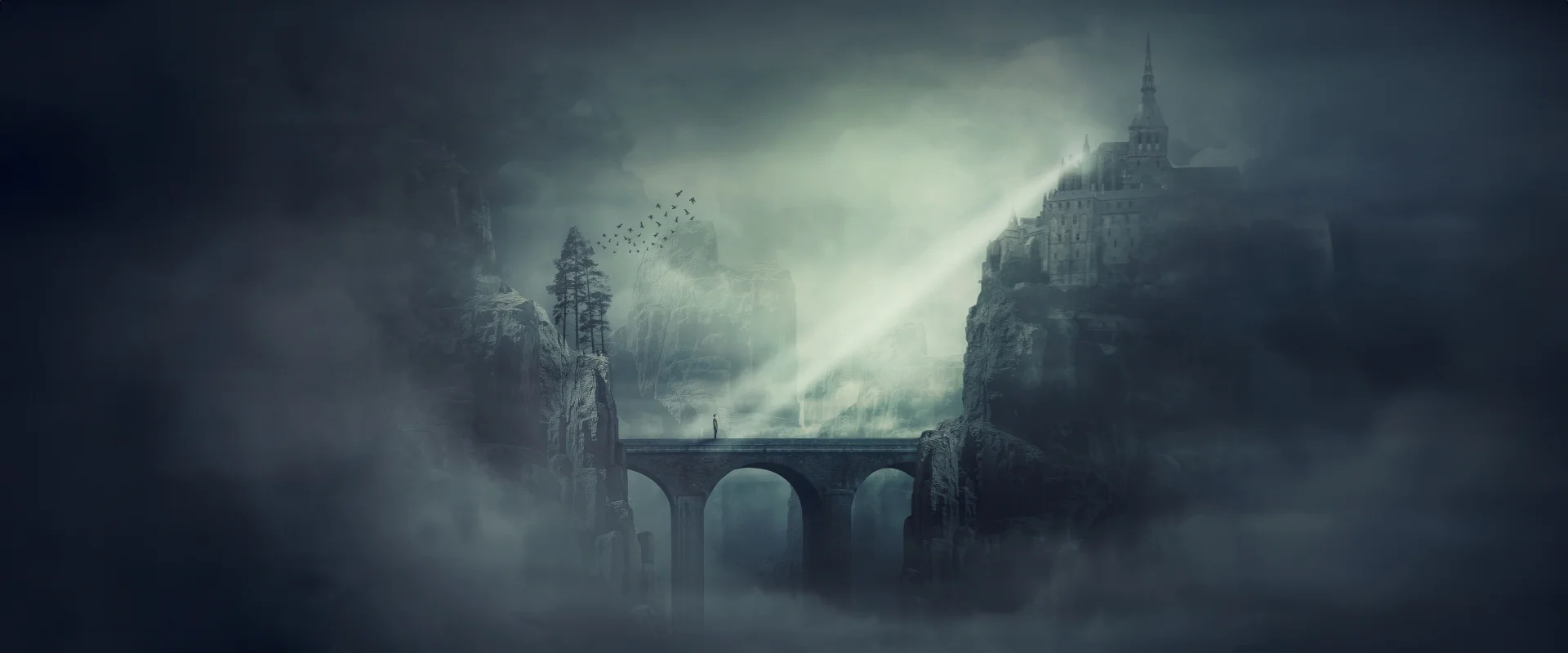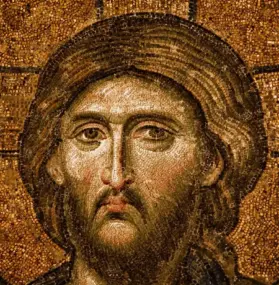- by Carrie Shaw
- on September 2, 2025
One of my favourite themes in the Bible is that of the two kingdoms.
There’s so much happening across the Bible’s pages that it can be easy to miss this theme at first glance. Understandably, we often spend more time on what seems more central – the ministry of Jesus Christ and the New Testament stories of the early church, which fill our sermons, books, and conversations.
Less popular, perhaps, is the great swathe of literature known as the Old Testament, covering centuries of Israel’s story with its rich tapestry of genealogies, laws, psalms, prophecies, and proverbs. We can sometimes venture into this part of Scripture and feel a bit lost, unsure how to make sense of its ancient laws, poetry, and prophets.
I think, however, that an awareness of the thread of ‘two kingdoms’, which runs from start to finish in God’s great story, gives us a helpful framework as we read both Old and New Testaments. It reminds us that alongside the visible kingdoms of this world runs the unseen yet ever-present Kingdom of God – a kingdom that calls, challenges, and transforms us even now.
The reality of these two kingdoms provides the larger narrative in which the Old Testament prophecies and stories, the New Testament apostolic teachings and, ultimately, the work of Jesus rests.
The tension between the two kingdoms – the kingdom of God and the kingdoms of this world – has played out throughout human history, the roots of which are deeply embedded in Eden’s soil. There, at the tree, the first fracture opened: humanity grasped for a crown apart from its Maker.
Ever since, Scripture shows the clash of these two kingdoms, weaving through Israel’s story, the rise and fall of empires, and finally finding its fulfilment in Christ, who himself proclaimed, ‘The Kingdom of God is at hand’ (Mark 1:15).
Genesis 3: A new kingdom is birthed
If you’ve read ‘The Magician’s Nephew by C S Lewis, you’ll recall the scene where Aslan is speaking with Digory, to whom he’s about to give an important mission for the new world of Narnia (if you haven’t read it yet, get your hands on a copy – it’s a great read!)
“You are to go on,” said Aslan, “to the garden in the west and pluck an apple from the tree that grows there and bring it back to me. Yes, child. I know what you would say. This is no ordinary apple, but a fruit of great power. It is your part to bring it back. For I have made Narnia quick and alive. It is only five hours old and already evil has entered it.“
“It is only five hours old and already evil has entered it.” It is such a profound line, in a wonderfully archetypal literary work, by which Lewis parallels the real events that transpired in our own world, when Eden was only just fresh and new and good.
A serpent’s whisper sowed doubt and pride, and the garden, bursting with life and promise, became the first battleground where the tension between these two kingdoms first broke into human history.
Humanity might have supposed they would remain enthroned as God’s image bearers, ruling and stewarding the earth on His behalf. This was, after all, the purpose and mandate for which they were created.
But what actually happened was that they relinquished their birthright and exchanged it for a mess of pottage, just as Esau would later do with his brother Jacob in Genesis 25:29–34. They exchanged something priceless – the glory of sharing in God’s rule – for the ultimately empty promise of the serpent of becoming ‘like God” and, in doing so, unwittingly handed their authority to the powers of darkness.
The New Testament later reflects on Esau’s choice in Hebrews 12:16-17, warning believers not to be “godless like Esau, who for a single meal sold his inheritance rights.” The writer of Hebrews urges believers to guard their hearts so they do not make the same tragic exchange – trading the riches of their true inheritance in Christ for the empty promises of the kingdoms of this world.
The Dominion Of Darkness
So instead of becoming like God in the way they imagined, the first humans discovered shame, dethronement, slavery to sin, and ultimately death.
And from that moment on, a rival power has ruled over fallen humanity.
Scripture will go on to give many descriptors for what this kingdom, called in one place the dominion of darkness, is like (Colossians 1:13). Marked by pride, injustice, violence, and idolatry, it produces the kind of twisted fruit that only flourishes in dark places, beautiful but poisonous, alluring yet deadly to all who eat it.
This kingdom is not just an ancient reality; it is a present truth, pressing in on every age, shaping systems, cultures, and human hearts that resist the true King (John 12:31, John 16:11, 2 Corinthians 4:4, Ephesians 2:1-2, 1 John 5:19, Acts 26:18).
Throughout Scripture, the power behind the dominion of darkness is described in many ways. We read of ‘Satan’ – the adversary who stands against God’s ways (Job 1:6; Zechariah 3:1). We see ‘the devil’ – the slanderer and deceiver who tempts humanity away from trust in God (Matthew 4:1).
The earliest pages speak of ‘the serpent’ – that ancient voice of doubt and pride in Eden’s garden (Genesis 3:1; Revelation 12:9). Jesus calls this power ‘the ruler of this world’ (John 12:31) and Paul describes it as ‘the god of this age’ (2 Corinthians 4:4) and ‘the prince of the power of the air’ (Ephesians 2:2). John simply names it ‘the evil one’ (1 John 5:19).
All these words remind us that Scripture names and exposes the power of sin and rebellion – a force that resists God’s Kingdom and blinds many to His light. Yet even as the Bible describes this dominion of darkness, it also declares its defeat: the serpent’s head will be crushed (Genesis 3:15), the ruler of this world stands condemned (John 12:31), and the power of darkness will not have the final word – Christ does.
The Kingdom of Heaven
The sovereignty and rule of God have always existed and will always exist (Psalm 47:7, 1 Chronicles 29:11, Exodus 15:18, Psalm 103:19). He is the true King while the ruler of this world is merely an imposter, a usurper to a throne that rightfully belongs to God.
In Orthodox Christianity, there is no equal struggle; God alone is sovereign, and evil is no legitimate rival. The Kingdom of Heaven will one day fully break into this world and finally defeat the powers of evil.
Jesus talked about the Kingdom of Heaven a lot. It was at the heart of his teaching and one of the major talking points in his discourses, from parables and sermons to personal conversations with his disciples
“The formula “kingdom of God” or the “kingdom of heaven” occurs 104 times in the Gospels. This message is not only the inaugural message of Jesus and the focus of His great Sermon on the Mount, it is his final message. “After he had suffered, he also presented himself alive to them by many convincing proofs, appearing during forty days and speaking about the kingdom of God” – (Acts 1:3). | SBC Life
The Kingdom of God has been breaking into the kingdoms of this world ever since God first promised that the serpent’s head would be crushed (Genesis 3:15).
It broke through in glimpses and shadows throughout Israel’s story – in covenant, temple, prophecy, and faithful remnant. But it finally broke in fully when Jesus, the true King, stood on the hills of Galilee and declared, “The kingdom of heaven is at hand” (Matthew 4:17). In fact, he said, “the kingdom is among you” (Luke 17:21). God’s reign was not distant and somewhere in the future but already here, hidden yet real, now-but-not-yet, actively breaking into this present age.
Like yeast in dough, like a tiny seed that would one day grow into a mighty tree, the latent power of the Kingdom was already present and at work, unseen by many, yet changing everything it touched.
And Jesus warned that, “From the days of John the Baptist until now, the Kingdom of Heaven has been subjected to violence, and violent people have been raiding it” (Matthew 11:12). Even so, the gates of hell will not prevail against it – this Kingdom will continue to advance, unstoppable, until all things are made new (Revelation 21:1).
Jesus’ Sermon on the Mount can be considered his Kingdom manifesto. In it, he describes what this Kingdom looks like and who its citizens are. The poor in spirit, the meek, the merciful, the pure in heart, the peacemakers – these are the ones he calls blessed, for “theirs is the kingdom of heaven” (Matthew 5:3).
These teachings turn the world’s values upside down, subverting the power of the evil one. God’s Kingdom is not built on power, pride, or self-rule, but on humble trust, costly love, and faithful obedience to the true King.
The beating heart of the Kingdom was most powerfully shown by the sacrifice of its own King, who gave himself to rescue and redeem humanity from the dominion of darkness – fulfilling the promise made so long ago in Eden. Through the cross and resurrection, the power of darkness was broken (Hebrews 2:14), yet its final and absolute defeat still lies ahead, when the King returns to finally make all things new (Revelation 20:10, 14, 21:4).
Which Kingdom Are You In?
Unlike Adam and Eve, none of us start out in the Kingdom of Heaven.
Because of their disobedience and rebellion, humanity was cast out of Eden’s garden, and banished from the tree of life – that first dwelling place where heaven and earth met.
Since then, every one of us has been born into a world in the shadow of that lost Kingdom, living under the rule of self and sin rather than the reign of God. This is our default kingdom of birth: estranged from God, exiled from our true home, and living in spiritual darkness (Romans 5:12, Ephesians 4:18, Genesis 3:23-24).
We may not know exactly how to name it – exile – but we all feel it. We search for purpose, we question the meaning of life, and we long for belonging. Ecclesiastes says, “God has put eternity in the human heart” (Ecclesiastes 3:11) – that whisper of yearning that calls us back to the true Kingdom we were made for.
J. R. R. Tolkien, author of the well-known Lord of the Rings trilogy, was deeply aware of humanity’s longing for home and the ache of exile, themes he wove throughout his stories of wandering, loss, and hope. He once wrote, “We all long for Eden, and we are constantly glimpsing it: our whole nature at its best and least corrupted, its gentlest and most humane, is still soaked with the sense of exile.” (Letters of J.R.R. Tolkien, #131)
The entire biblical story is one of exile and return, and, at its centre, Jesus Christ, the true King who stepped into our exile to bring us home.
Genesis shows the human story starting in a garden, with a tree, a choice, and a consequence. And Scripture shows the story ending in a garden once more – where the tree of life stands beside the river, and there is no more curse, only life and healing forever (Revelation 22:1–3).
Good News: The Fearless Path Home
But how? How do we step out from the dominion of darkness into the Kingdom of God, from decay and death into life, and life abundantly?
This is the good news of the gospel. Those who put their trust in Jesus Christ, in his work of atonement and redemption on their behalf, and believe that he is truly the risen Lord and Christ, are saved, rescued, redeemed, and restored to the Father’s house and brought into the Kingdom of His Son.
They become citizens of Heaven, children of Abraham by faith, inheritors of the promises God first made so long ago – heirs of a Kingdom that cannot be shaken (Hebrews 12:28) and which will one day fill the whole earth.
Like Adam and Eve, each one of us gets to choose. We can remain under the rule of self and sin, living as exiles far from our true home, Or we can trust the true King, step into the light of his Kingdom, and be welcomed back to the Father’s house.
This is the invitation of the gospel: to turn, to trust, and to come home.
“If the incarnation teaches us anything, it’s that God didn’t come to earth to show us how to be good so we could get to heaven. God came to bring heaven to us, to restore and redeem and reconcile the whole world to Himself – to bring us home.” | Rachel Held Evans (1981–2019)
If the gospel is a new thought for you, I hope you’ll sit with it, let it stir your questions, your hopes, your longing for something more than this world can offer. Ask your questions, wrestle with your doubts, and know that you are not alone in seeking the truth.
And if you’ve known the good news before but find yourself weary or forgetful of its joy, remember: there is always a path back. Grace is not for perfect people but for the ones who know they need it most. The door is still open, and the Father still waits to welcome you home.
If you’d like to talk more, share your story, or simply ask where to begin, I’d love to hear from you. Reach out anytime.
“If I find in myself desires which nothing in this world can satisfy, the only logical explanation is that I was made for another world.” | C S Lewis






